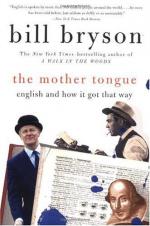
|
| Name: _________________________ | Period: ___________________ |
This test consists of 15 multiple choice questions and 5 short answer questions.
Multiple Choice Questions
1. According to the author, the English language will __________ as it has throughout history.
(a) Dominate
(b) Adapt
(c) Grow
(d) Mutate
2. A trend seen on both sides of the Atlantic is that of _________________________.
(a) punishing for swear words said in public
(b) fining for swear words written in public
(c) restricting swear words in public
(d) whispering swear words in public
3. How many words does the dictionary mentioned in #117 contain?
(a) 750,000
(b) 800,000
(c) 700,000
(d) 600,000
4. In what countries is English studied?
(a) Countries all over the world
(b) Europe
(c) Asia
(d) North America
5. Why does the author feel it is difficult to trace the history of swearing?
(a) Swear words are primarily spoken, not written down
(b) Countries do not want to be known for swearing
(c) People don't want their children exposed to it
(d) People are reluctant to talk about their swear words
6. What type of names go through an adaptive period to reach worldwide markets?
(a) Financial
(b) Commercial
(c) Political
(d) Publishing
7. Many words that were once considered taboo are now considered to be ______________________.
(a) inappropriate
(b) slightly offensive
(c) quite innocent
(d) vulgar
8. What is the mission of the English-only movement in the U.S.?
(a) Find funding to teach English in third world nations
(b) Find funding for the study of the English language
(c) Make English the official language
(d) Finance its own dictionary
9. According to the author what will happen when English comes into its own as a modern language of international importance?
(a) Regionalism will take over
(b) Communication will break down
(c) The language will run amuck
(d) There will be fewer rules imposed
10. In what year was the crossword puzzle invented?
(a) 1945
(b) 1913
(c) 1965
(d) 1889
11. What element guides generational language?
(a) Regionalism
(b) Superiority
(c) Pop culture
(d) Colloquialisms
12. What are the risks of being unaware of international translations of company names and messages?
(a) Being misunderstood
(b) Targeting the wrong prospects
(c) Being perceived as too expensive
(d) Being negative or offensive
13. Words that enter American and British vocabularies generally come from what country?
(a) America
(b) Italy
(c) France
(d) England
14. Original names from _______________ or Native American times have slowly shifted in spelling and pronunciation.
(a) Spanish
(b) Celtic
(c) British
(d) Latin
15. British surnames are the product of confusing pronunciations and ____________________.
(a) colloquialisms
(b) word combinations
(c) accents
(d) spellings
Short Answer Questions
1. Translations between English and ______________ are particularly difficult.
2. Historians show real _______________ by piecing together a record of the human community without definitive proof.
3. Chapter 15 addresses the history of what?
4. How many words were contained in the dictionary mentioned in #113?
5. What do the British borrow from American English?
|
This section contains 404 words (approx. 2 pages at 300 words per page) |

|




